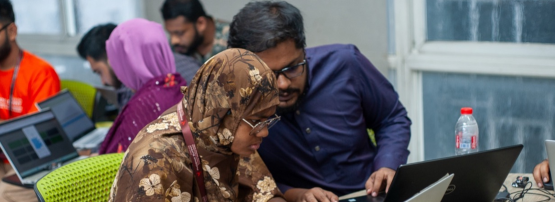
What makes the APNIC Community Honeynet Project rewarding isn’t just the technical work behind the scenes, it’s the chance to connect with others working to build safer, stronger networks across the Asia Pacific.
In May, I had the privilege of joining Samiul Islam from BGD e-GoV CIRT to run a three-day workshop on honeypots and threat hunting at the Phoenix Summit 2025 in Dhaka, Bangladesh. The workshop ran from 19 to 21 May 2025 and brought together 20 participants from sectors including finance, ISPs, and academia, many of whom were supported by the community to attend.
What stood out most was the curiosity, collaboration, and enthusiasm from the participants, particularly the mix of seasoned professionals and students, which made the event a genuine learning experience for everyone involved. The final day featured a mini-Capture the Flag (CTF) event where teams tackled challenges together, often crossing organizational and generational lines to do so. For me, this kind of cross-pollination is what community development should look like — where newcomers are welcomed and experienced professionals share their knowledge.
Honeypots in practice
The training was intentionally practical with around 60% of the time dedicated to hands-on labs. Participants deployed honeypots and honeytokens that can be used to detect potential breaches, analysed real artefacts, and even worked directly with infrastructure used in the APNIC Community Honeynet Project.
My co-instructor, Samiul, led sessions on building automated threat hunting systems using open-source tools. This is the sort of work that can have an immediate impact when deployed locally. Check out the script that was used for his lab.
Finally, I shared some insights related to running the project and using data from it to generate feeds for DASH, APNIC’s network health dashboard.
Supporting local expertise
Beyond the technical material, this workshop reinforced the importance of recognizing and supporting local expertise. While international speakers often headline events, it’s equally important to raise local voices — those who understand the on-the-round realities and are actively working to improve them. The local contributions, organizers, and volunteers were a reminder of how much talent exists within our own communities.
Connecting through the Honeynet Project
The APNIC Honeynet Project isn’t just about technology. It’s about building trust, sharing knowledge, and helping security teams across the region learn from one another. Earlier this year, we held threat-sharing sessions with MyCERT in Malaysia and CERT Vanuatu. These are meaningful steps in growing a community that spans borders but stays grounded in local needs.
Thanks to everyone who made the Phoenix Summit workshop a success, especially co-instructor Samiul Islam, lead organizer A.S.M. Shamim Reza, and the volunteers who brought warmth and professionalism to every detail. Most of all, thanks to the participants for your engagement and the knowledge you shared. I hope we get to work together again soon.
The views expressed by the authors of this blog are their own and do not necessarily reflect the views of APNIC. Please note a Code of Conduct applies to this blog.
